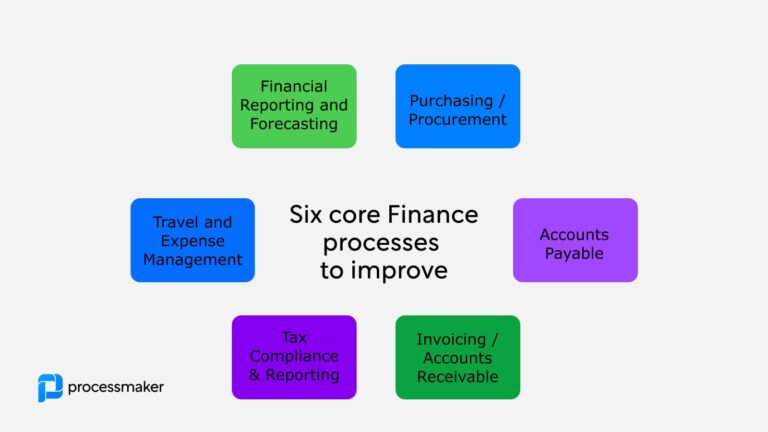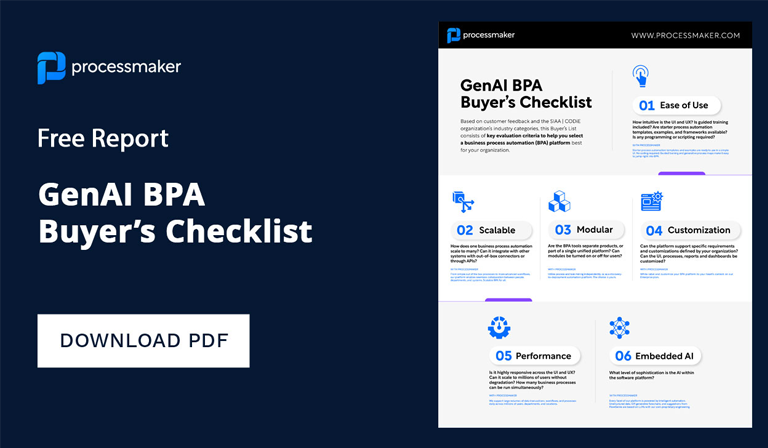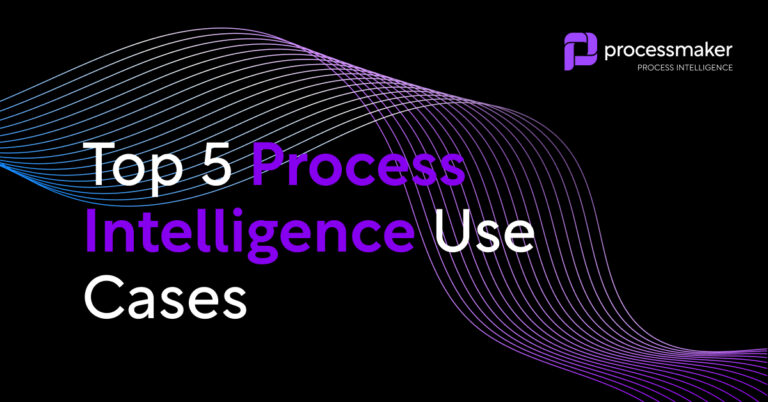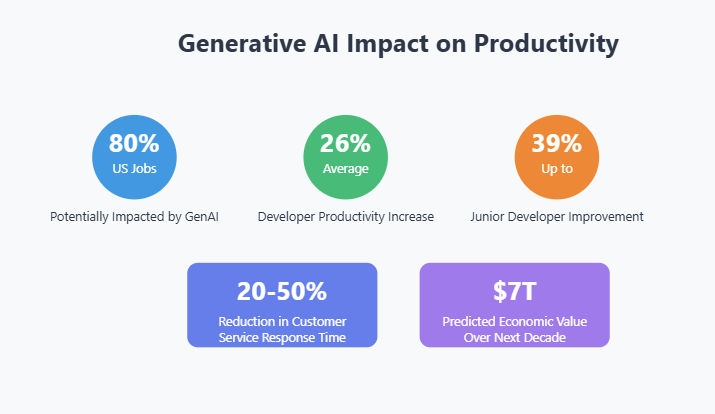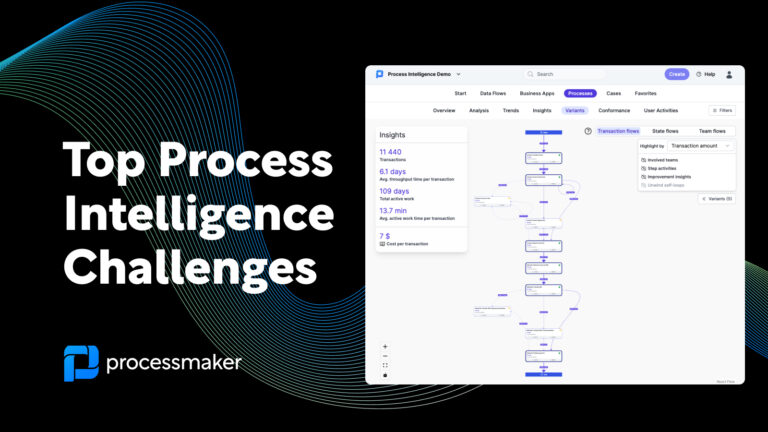Imagine having a window into the inner workings of your company’s finance department, revealing the complex network of tasks and processes that oversee every transaction, approval, and report. Process intelligence offers you this insightful view – and it has grown increasingly tailored to the requirements of finance leaders.
Process intelligence provides several benefits including accelerating automation, improving operational efficiency, reducing costs, and enhancing compliance and governance.
Finance process intelligence is a new analytical technique that extracts data from various business applications and workflows to discover, monitor, and improve business processes. The solution combines the best elements of task and process mining to suit the complex needs of today’s digitalized finance departments. Before we go through key use cases for finance process intelligence, let’s go through some fundamentals.
What are the core financial processes?
At the core of every business lies its essential finance department, which holds the keys to the organization’s financial success and stability. Finance departments play a crucial role in the overall health and growth of a business. They carry the responsibility of overseeing the company’s financial resources, making informed decisions, and providing valuable insights that help shape the organization’s future through effective business process management.
A finance and accounting department can take on a broad set of responsibilities for anything from bookkeeping, invoicing, expense approvals, budgeting, and forecasting. More broadly, finance teams often lead and facilitate go-to-market strategies through CAPEX and OPEX investments and manage risks and accountability to suppliers and tax authorities.
The core finance processes are simply the tasks and workflows managed by the finance and accounting department to manage the company’s financial resources to meet the business objectives.
Six core finance processes
Each finance department is different. If you ask six CFOs for a list of their core processes, you’ll get six different answers. Still, we can distill the key finance operational processes to the following shortlist.
- Purchasing
- Accounts payable
- Invoicing and accounts receivable
- Tax compliance and reporting
- Travel and expense management
- Financial reporting
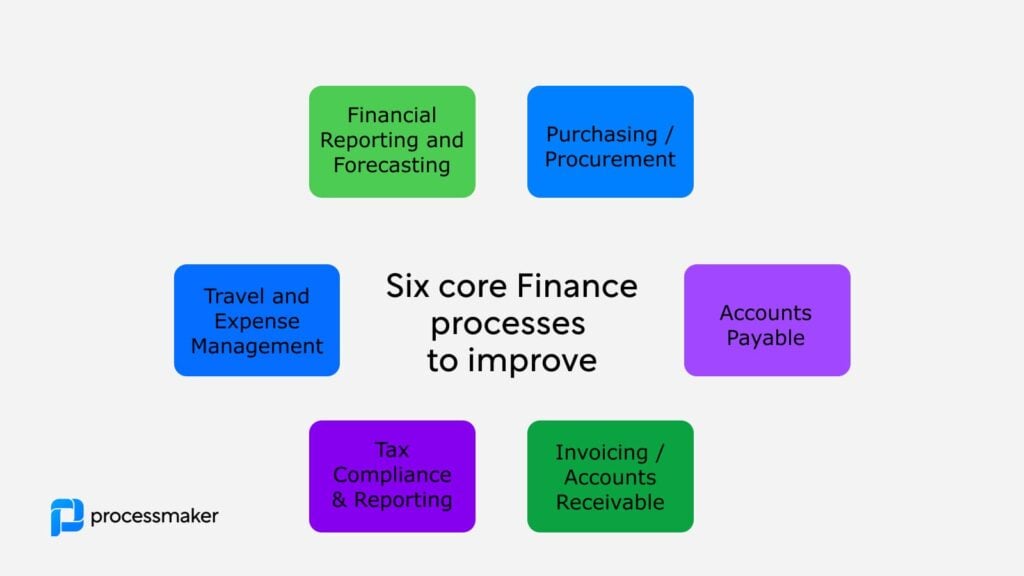
Six core finance processes to improve with process intelligence
Business process optimization can help streamline and improve these processes by using process intelligence to acquire and synthesize process data, identify inefficiencies and bottlenecks, and ultimately pave the way for optimization and automation of business processes.
Who is responsible for finance processes?
The responsibility for finance processes lies with a dedicated team of professionals, from the CFO to the payroll administrator. In some larger organizations, this may include dedicated departments for individual functions, such as Accounting, Accounts Payable, and Accounts Receivable. In smaller organizations, it may simply be a team of finance managers and controllers who manage a diverse set of tasks, workflows, and processes.
More broadly, everyone should take some ownership of finance operations and controls of their organization. Nearly every employee interacts with the finance team in some capacity, be it budgeting for business operations, payroll, or just approvals for travel expense claims. If there are challenges with the resources or capacity of the finance team, everyone is likely to feel it. Manual processes or inefficient approval process steps quickly add up to take up valuable time and resources from the entire organization.
What’s usually wrong with core finance processes?
While companies might face varying financial realities, the health of financial transactions is hardly a problem with core finance processes. Most firms can generate financial statements accurately, record business revenue properly, and manage cash flow effectively.
The primary challenge for finance teams lies in managing the capacity of the finance team across a multitude of financial process controls and workflows. Key processes and process bottlenecks may become cumbersome to manage across a vast array of different IT systems and business applications.
On average, a large enterprise business runs on over 170 different business applications. There may be different applications finance teams use to manage payment requests, strategic planning, vendor approvals, travel expenses, and so on. In addition, financial data often needs to be consolidated or reported in different kinds of management dashboards, leading to a large amount of manual data entry and toggling between multiple systems. Recent research by ProcessMaker found that a typical finance team employee spends 90 minutes each week toggling between different applications and 50% of their work time on repetitive tasks.
How do you know you have finance process challenges?
The nature of finance departments is often hectic and fast-paced. However, a few common symptoms separate healthy financial processes from chronic finance process failure:
- Delayed or slow approval – if payments are regularly delayed or approval processes are inefficient.
- Lack of clarity of roles – when it’s not clear who is responsible for key metrics or tasks in processes and workflows.
- Difficulty managing workload – when the finance team constantly works overtime to meet monthly closing processes or other regular tasks.
- Lack of visibility – when leadership is not able to measure and impact the end-to-end processes that occur across different business functions and IT systems.
- Continuous improvement – when there is a lack of process intelligence to drive continuous improvement by identifying bottlenecks, fostering accountability, and enabling ongoing optimization and adaptation to changing business conditions.
How process mining can identify and fix finance process challenges
Finance process intelligence is a new software solution that combines the best parts of process mining and task mining solutions to give end-to-end visibility to all core financial processes and finance operations. The solution has been built from the ground up to meet the demanding needs of business operations professionals who have a goal to eradicate inefficient processes, streamline redundant tasks, and automate manual work through intelligent process automation.
Finance process intelligence gives immediate visibility into existing process health and gives actionable insights into opportunities to improve efficiency, replace outdated systems, and remove manual work through automation software. It’s a plug-and-play software that helps you make better business decisions and optimize finance operations with data you can trust. Additionally, process intelligence tools play a crucial role in monitoring and optimizing finance processes by identifying bottlenecks, ensuring compliance, and accelerating the discovery-to-automation lifecycle.
How business process optimization benefits six core finance processes
Purchasing
Process intelligence software breathes new life into the purchasing function by streamlining workflows and automating routine tasks. It enables finance teams to make informed decisions based on accurate and up-to-date data, fostering a sense of confidence and control over procurement processes. By eliminating inefficiencies and reducing the risk of errors, process intelligence software contributes to a more cost-effective and responsive purchasing function, which has a positive emotional impact on the organization’s overall financial health. A comprehensive process intelligence solution addresses the limitations of first-generation process mining and task mining tools, fully supporting key pillars for a holistic approach to process transformation.
Accounts payable
Managing accounts payable can be a challenging and emotionally charged process, as it involves maintaining good relationships with vendors and ensuring timely and accurate payments. Process intelligence software simplifies this function by automating payment processing and providing real-time visibility into outstanding invoices. This enhanced oversight not only reduces the risk of late payments and penalties but also fosters a sense of trust and reliability among suppliers, ultimately contributing to smoother and more harmonious business relationships. Additionally, process mining tools can be used to analyze real-world data, retrospectively analyze processes, and identify bottlenecks and inefficiencies, further improving the accounts payable function.
Invoicing and accounts receivable
Process intelligence software revolutionizes the invoicing and accounts receivable function by identifying bottlenecks, reducing errors, and streamlining payment processing. It empowers finance teams to proactively manage outstanding invoices and improve cash flow, alleviating the emotional stress associated with managing the organization’s financial resources. By improving the efficiency and effectiveness of this core function, process intelligence software contributes to a more stable and financially secure business. Robotic process automation (RPA) further enhances this by automating repetitive tasks, ensuring accuracy, and working seamlessly with process intelligence to optimize invoicing and accounts receivable processes.
Tax compliance and reporting
Navigating the complex world of tax compliance and reporting can be a daunting and emotionally charged task. Business process management, integrated with process intelligence software, simplifies this function by automating data collection, tracking relevant tax laws and regulations, and ensuring that the organization remains compliant. By reducing the risk of non-compliance and potential penalties, process intelligence software provides finance teams with a sense of security and peace of mind, enabling them to focus on strategic initiatives that drive business growth.
Travel and expense management
Managing employee travel and expenses can be a time-consuming and emotionally fraught process, as it requires balancing cost control with employee satisfaction. Process intelligence software streamlines this function by automating expense reporting, tracking compliance with company policies, and providing real-time visibility into spending. By leveraging business process data, organizations can continuously acquire, analyze, and utilize data to gain insights, improve efficiency, and drive decision-making in travel and expense management. Financial reporting is an emotionally charged process, as it provides stakeholders with a snapshot of the organization’s financial health and influences critical business decisions.
Financial reporting
Process intelligence software supports this core function by automating data collection, ensuring accuracy and consistency in financial reports, and providing real-time insights into financial performance. This enhanced visibility and control enable finance teams to produce timely and accurate reports, fostering trust and confidence among stakeholders and contributing to the company’s overall success.
Additionally, process intelligence tools play a crucial role in improving financial reporting processes by monitoring end-to-end processes, identifying bottlenecks, and ensuring compliance requirements are met.
The role of process intelligence tools
In conclusion, process intelligence software is a powerful tool that can revolutionize core finance functions, streamlining workflows through intelligent process automation, enhancing data visibility, and improving decision-making. By addressing the emotional aspects of these functions, businesses can cultivate a more efficient, resilient, and emotionally balanced finance department that drives the organization’s financial success. This enhanced oversight allows finance teams to make data-driven decisions that contribute to more efficient and cost-effective travel and expense management, ultimately fostering a positive work environment and supporting employee well-being. Additionally, process intelligence plays a crucial role in enhancing data visibility and decision-making, leading to continuous improvement and better compliance.
